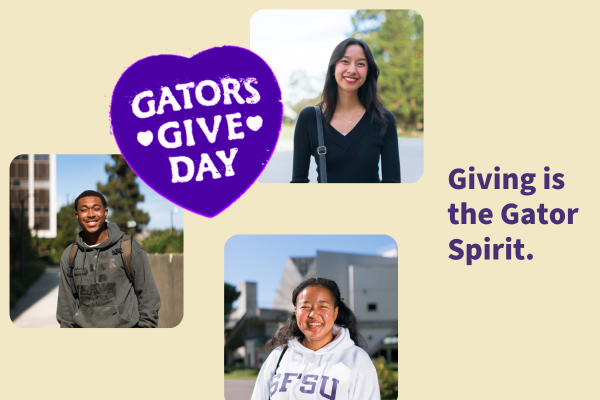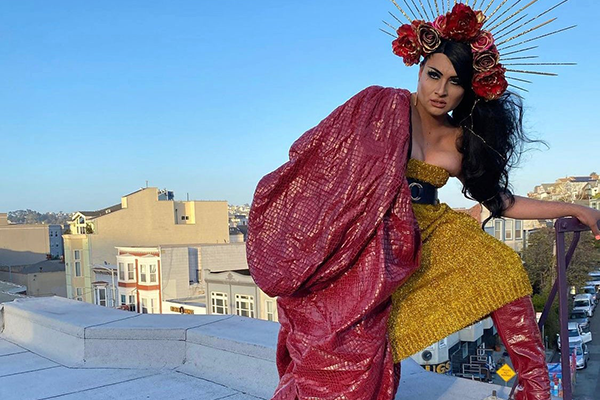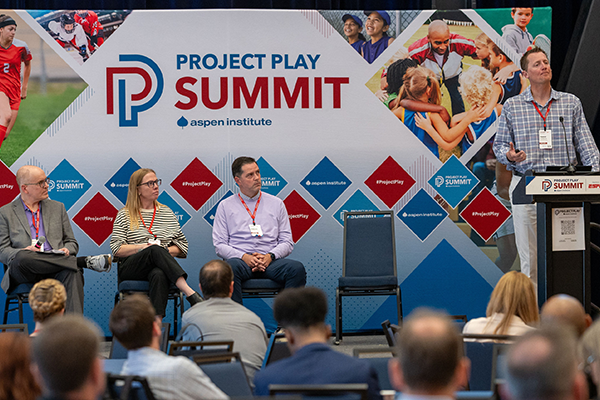News and Announcements

Thanks to the generous support of the University’s alumni, faculty, staff, students and friends, SFSU’s inaugural Gators Give Day was a resounding success. More than 640 Gators united on April 2 and raised over $109,000 in just 24 hours. These gifts will immediately impact scholarships, academic programs, student organizations and essential University initiatives.
“This extraordinary day truly highlights the community spirit that defines SFSU,” said Director of Annual Giving Mike Sullivant. “We are grateful to everyone who participated and helped us meet our goal of empowering student success.”
If you missed Gators Give Day or still want to help, there’s always time to make a difference. Ongoing support ensures that SFSU will continue to deliver excellence and access to transformative education rooted in equity and innovation. Go Gators!

Now is the ideal time for students to plan to study abroad in spring 2026 or fall 2026. Before students select their classes for the next semester, SF State Abroad recommends that students identify their top two to three programs for spring 2026 and determine which classes are available abroad and which classes would be better for them to take at SF State.
Please encourage students to attend an information meeting if they need help getting started. They can watch a recorded session on YouTube, attend in person every Wednesday at 3 p.m. in Building C of the Village (next to U.S. Bank), or RSVP for the Zoom sessions every Friday at 2 p.m.
The priority deadline for spring 2026 is Sept. 15. Applications are open for spring 2026 and fall 2026.

Worried about midterms? Tired working multiple full-time jobs? Uncertain about your career? Have a dilemma you would like to talk about? Campus mediators in training will listen to you without judging and offering advice. Students from the Communication Studies 430: “Peer Mediation” class will have their active listening booth outside Cesar Chavez Student Center on Monday, April 8, 1 – 4 p.m., and Monday, April 15, 1 – 4 p.m.
The class will be offered in the fall on Tuesdays, 2 – 3:40 p.m. Communication Studies 430 meets the requirement of the interdisciplinary Conflict Resolution certificate. For questions about the class or the certificate, please email Ashmi Desai at ashmidesai@sfsu.edu.
Photo courtesy of Ashmi Desai
The CSU Board of Trustees requires presidents to be reviewed every three years, and a review of SF State President Lynn Mahoney, who came to the University six years ago, has begun.
The SF State Academic Senate will meet Tuesday, April 8, 2 – 5 p.m., via Zoom for its 11th meeting of the academic year.
- Recommendation from Academic Policies Committee in first reading:
- Revision to Policy on Restructuring Academic Units #S21-290
- Recommendation from the Educational Policies Council proposed program suspension in first reading:
- Bachelor of Arts in Chinese: Concentration in Flagship Chinese Language
- Master of Arts in Anthropology
- Master of Arts in Women and Gender Studies
- Recommendation from the Strategic Issues Committee in first reading:
- Proposed Revision to the Academic Freedom Policy #F13-267
- Recommendation from Student Affairs Committee in first reading:
- Resolution Calling for a Report on the Instruction of Reading and Writing
- Resolution in Support of Student Parent Success at San Francisco State University
- Recommendation from Academic Policies Committee in second reading:
- Revision to University Policy on Written English Proficiency, #S19-014
- Recommendation from the Strategic Issues Committee in second reading:
- Revision to All-University Committee on International Programs, #S20-151
- Resolution to Endorse AS-3609-23 Encouraging Campus Faculty Legislative Liaisons
- Recommendation from the Faculty Affairs Committee in second reading:
- Revision to Department Chairs and Equivalent Unit Directors, #S24-145
- Revision to Policy on Emerita/Emeritus Status, #F14-147
- Academic Senate will hear formal presentations from:
- Christopher Clark, director of integrated college communications: “Website Redesign” (time approximate 3:45 – 4 p.m.)
- Rob Collins and Dipendra Sinha, Academic Senate of the CSU (ASCSU) senators: “ASCSU Update” (time approximate 4 – 4:15 p.m.)

Come to the Library for “Drag Story Hour” on Tuesday, April 8, at 12:30 p.m., on the first floor near the book checkout and pickup desk. All ages are welcome.
The storyteller, Per Sia, is a regular performer in the nationally acclaimed “Drag Story Hour” as well as an educator in residence at an after-school arts program in the San Francisco Unified School District. Sia has been profiled on KQED, National Public Radio and CNN.
“Drag Story Hour” captures the imagination and play of the gender fluidity of childhood and gives children — and people of all ages — glamorous, positive and unabashedly queer role models.
Please email the J. Paul Leonard Library Student Success and Engagement Team at libsse@sfsu.edu for more information.
Photo by Timoteo Rodriguez
The “Generative AI for Visual Design” course offers an exploration of visual generative artificial intelligence (GenAI) tools for image and design generation. It will be held Wednesday, April 9, 11 a.m. – 12:30 p.m., via Zoom.
Participants will gain a primer on visual GenAI tools, considerations for using GenAI and best practices for creating effective and accessible designs. Through hands-on activities, participants will develop skills in crafting descriptive prompts and selecting appropriate visual styles to generate unique images using Adobe Firefly. Additionally, they will learn how to generate visual elements to be incorporated into designs using Adobe Express.
This course is required to receive a digital badge for the AI Literacy Education Program.
Please visit the AI website to register for the “Generative AI for Visual Design” course.
The “Collaboration with Zoom AI Companion” course introduces participants to the Zoom AI Companion and its practical applications within a university setting. It will be held Thursday, April 10, 2 – 3:30 p.m., via Zoom.
The course covers key features such as meeting summaries, real-time Q&A, interactive smart recordings and whiteboard tools for generating sticky notes, tables, mind maps and flowcharts. Participants will learn how to apply these tools to enhance productivity, collaboration and learning in academic and administrative contexts through guided demonstrations and hands-on activities.
This course is required to receive a digital badge for the AI Literacy Education Program.
Please visit the AI website to register for the “Collaboration with Zoom AI Companion” course.
Join Academic Technology and J. Paul Leonard Library for an “Affordable Instructional Materials Review Workshop” on Thursday, April 10, 9 – 10:30 a.m., via Zoom. This hands-on session will guide faculty in evaluating the quality of published open educational resources and free-to-use materials exploring strategies for creating high-quality course content.
Spaces are limited to the first 15 registrants. Please note that only faculty teaching this semester are eligible to apply; participants in the faculty early retirement program are not eligible. Honoraria of $100 will be available for faculty who participate, with additional funding opportunities for those adopting affordable instructional materials.
Please register via Qualtrics.
For questions or more information, please visit the Affordable Learning website or email Academic Technology at at@sfsu.edu.
Staff members are invited to the next Staff Forum on Wednesday, April 16, 10 – 11 a.m., hosted by the Office of Human Resources via Zoom. All SFSU staff, except management personnel plan employees and faculty, are encouraged to attend.
At this meeting, Academic Technology and Information Technology Services will lead a hands-on training with ChatGPT to help boost skills in artificial intelligence.
To opt into all meetings and for the Zoom link, please RSVP via Qualtrics.
Prospective students are invited to information sessions to learn about the Department of Child and Adolescent Development’s undergraduate programs, opportunities for students and admissions. They will be held Tuesday, April 15, 5 – 6 p.m., and Thursday, April 17, noon – 1 p.m., via Zoom.
The “Ready, Set, Safety!” presentations are a series of lunch and learn meetings led by the Risk and Safety Services Division. These talks are designed to inform the community of risk mitigation programs in place at SF State. The next presentation will be held Thursday, April 24, 11:30 a.m. – 12:30 p.m., via Zoom. It will cover summer safety. Presenters will provide safety tips for social gatherings events taking place over the summer or in general.
The campus community is encouraged to attend and participate in these discussions as they offer an open forum for anyone interested in learning more about a variety of topics.
The College of Health & Social Sciences presents its 2025 De Cecco Lecture Series in LGBTQ+ Issues with Susan Stryker on Tuesday, April 29, 3 – 5 p.m., at the Seven Hills Conference Center. Her lecture is titled “At the Crossroads of Turk and Taylor: Transgender History in the Present, and the Future We Need.”
Stryker is distinguished visitor at the Clayman Institute for Gender Research at Stanford University and professor emerita of Gender, Women’s and Sexuality Studies at Arizona State University.
An hors d’oeuvres welcome reception will be held at 3 p.m. before the lecture presentation, which begins at 3:30 p.m. This event is open to SF State students, faculty, and staff.
Please join the Office of Strategic Marketing and Communications for “The SFSU Brand Story Town Hall,” a presentation and workshop on Wednesday, April 30, 9:30 a.m. – 3 p.m., in Library 121.
Strategic Marketing and Communications will introduce the University’s new brand messaging and visual identity. Presentations will explore the brand in depth, showcase how it will come to life and discuss the role of the University community in its success. This is an opportunity to get familiar with and aligned with “Brighter Here.”
The new brand messaging and visual identity are designed to bring greater clarity, consistency and distinction and align a collective voice to make communications efforts more powerful, engaging and effective. This is how the SFSU community tells its story collectively to prospective students and their families, alumni, campus partners and the broader communities.
Please visit the Strategic Marketing and Communications website for details and to RSVP. Seats are limited.
SF State Spotlight
A March 20 report on KGO-TV explores the federally mandated return of Native American remains and artifacts to tribes and ancestors. The segment quotes Journalism Professor Cristina Azocar and Presidential Aide Victor Aguilar.
Azocar explains the challenges involved for Indigenous tribes to receive federal recognition, a requirement to be eligible for repatriation.
“We’ve been fighting for 500 years, so we have a lot of resilience,” Azocar said. “But tribal leaders change, and so that is one thing that could make it hard. What’s often most difficult is the finances involved. It can take millions of dollars for a tribe to go through the federal recognition process because of the amount of material and the cost to collect that material.”
Aguilar serves as SFSU’s interim lead for tribal government relations.
“I'm only one voice, but being able to be that voice for this type of work is important because it shows people that we’re actually doing it,” Aguilar said.
Associate Professor of Nutrition and Dietetics Gretchen George, Kinesiology Professor Nicole Bolter and Daria Sosna are the authors of “Perspectives of a multi-module weight stigma intervention for prehealth undergraduate students” in Fat Studies.
The article explores the feasibility of integrating a weight-bias pedagogical intervention into a first-year experience university course by gathering perspectives from both instructors and students. Their findings suggest that with proper training and resources, non-expert instructors can effectively implement the intervention, with media sources and class discussions playing a key role in engagement.

Kinesiology Professor Nicole Bolter presented at the Aspen Institute’s annual “Project Play Summit” held March 24 – 25 at University of California, Berkeley. The “Project Play Summit,” presented by ESPN, is the nation’s premier gathering of leaders building healthy children and communities through sports. This year’s theme focused on “The Path to 63X30,” which is a public health target to get 63% of youth to participate in sports by the year 2030.
Bolter spoke on a breakout session panel during, “State of Play 2025: Who’s Playing, Who’s Not,” where the latest Project Play parent survey results were discussed among research council members and sport parenting experts. Bolter shared her latest research on Junior Giants, a free, non-competitive sport-based youth development program run by the San Francisco Giants Community Fund, and discussed how the program fits into the larger landscape of sport opportunities for youth.
Photo courtesy of Nicole Bolter
Associate Professor of American Indian Studies Robert Keith Collins published two chapters in “The Future is Indigenous: Stories from the new Native North America Hall at the Field Museum” (BAR Publishing). This open educational resource book will serve as the catalog for the Field Museum exhibit, “Native Truths: Our Voices, Our Stories.”
Chapter 2, titled “Local Knowledge in Museum Exhibits: The Relevance of Native American to Black History,” investigates how to explain the exchanges and impacts Native Americans of the region had on Africans and Europeans during contact. Collins states it must be noted that the contact, cultural exchanges and shared efforts in self-determination between Kitihawa and Jean Baptiste Point du Sable explain and illustrate both African and Native American cultural impact on contact populations and shared culture contributing to the formation of the City of Chicago.
Chapter 19, titled “Native Knowledge and Changing Museum Paradigms,” explores the relationship between Native knowledge and museum exhibits. To explore this relationship, this chapter examines how Native knowledge has been used to inform changing paradigms behind museum exhibit creation. In this chapter, Collins argues that museums, like the Field Museum, must continue to enable greater consultation with Native Americans and source communities, through best practices like advisory committees for exhibits, if holistic and culturally relevant and salient interpretations of objects of cultural patrimony within their collections are to be achieved.
Collins has served on the advisory board for the de-installation, redesign and re-installation of the Native North American Hall at the Field Museum since 2018.
Recreation, Parks, Tourism and Holistic Health Professor Erik Peper won the Biofeedback Federation of Europe Lifetime Impact Award In recognition of his exceptional leadership and enduring contributions to applied psychophysiology and biofeedback. He received the award last month at the federation’s 23rd meeting in Brescia, Italy.
Peper and Dr. Robert Gorter authored “Fever can save your life” in Townsend Letter on March 17.
James Dudley, lecturer faculty in Criminal Justice Studies, appears on a March 29 news segment on KGO-TV to discuss safety concerns in police pursuits.
“I feel so sorry for the victims of the families, but if police are no longer allowed to pursue, I can only imagine things will get worse and more dangerous on the streets,” he said. “We need to switch the emphasis from police being the bad guy here and look more sternly at the fleeing suspects.”